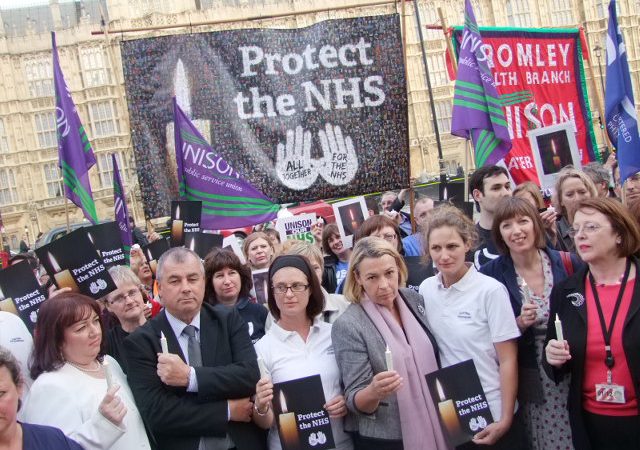'Under the Bill, protests could be banned because they are deemed to be noisy and disruptive and participants could be prosecuted'.

Prem Sikka is an Emeritus Professor of Accounting at the University of Essex and the University of Sheffield, a Labour member of the House of Lords, and Contributing Editor at Left Foot Forward.
Are you concerned about the consequences of Brexit, rising food and energy prices, low wages, environmental degradation, gender and ethnicity pay gap, low state pension, child poverty, rising hospital waiting lists, lack of social care, the cladding scandal, the loan charge scandal or the country’s participation in foreign wars?
If so, you might have thought about joining protests to mobilise public support and require governments to change laws. Well, soon all this is likely to be criminalised by parts of the Police, Crime, Sentencing and Courts Bill currently going through parliament.
The government rushed the 300-page Bill through the House of Commons. It has now arrived in the House of Lords and peers have severely criticised the government for its contempt for human rights.
Making noise and being heard are fundamental to any protest. People protest because parliament and governments are not responsive to their concerns. Whether they are civil rights, feminist, environmental, lesbian, gay, bisexual and transgender (LGBT) communities or anti-war demonstrators, people are asking to be included in the fabric of society. They ask for dignity and rights and draw attention to the destructive practices of corporations and abuses of power by the state.
Under the Bill, protests could be banned because they are deemed to be noisy and disruptive and participants could be prosecuted. The Police already have considerable powers to control and ban noisy demonstrations and have not requested additional powers. Nevertheless, the Bill introduces new noise triggers and protests would be banned where:
“the noise generated by persons taking part in the procession may result in serious disruption to the activities of an organisation which are carried on in the vicinity of the procession”
and
“the noise generated by persons taking part in the procession may have a relevant impact on persons in the vicinity of the procession”.
Key terms, such as “noise”, “serious disruption”, “relevant impact” and “assembly” are not defined in the Bill. The Bill permits the Home Secretary to define them i.e. make laws without any parliamentary scrutiny and Police Commissioners would be required to comply with them.
Even one-person silent protests can be banned and the participant prosecuted because a crowd might gather and cause noise and disruption in the form of a traffic jam which might delay the delivery of good and services.
Protesters could face a year in prison. Anyone falling victim to the new offence of intentionally or recklessly causing public nuisance can face imprisonment of up to 10 years. With 88,000 people in prison, the UK already has the highest number of prisoners per capita in Western Europe in its overcrowded prisons.
The Bill could be used to criminalise trade unions, peace marchers, environmentalist, feminists and anyone else seeking to change the status-quo. Those criminalised would find it difficult to get a job, mortgage, credit cards or even travel visas to countries, such as the USA. This fear may silence many. Unsurprisingly, Parliamentary committees have condemned the Bill as it erodes human rights.
This week, the good people of Liverpool protested about an arms fair to be held in the city. It is not criminal for companies to market weapons of mass destruction, but under this Bill it would be criminal for protestors to make noise about such a deadly trade being conducted in their neighbourhood.
Companies can cause disruption by moving production and through fire and rehire policies, but if workers protest and seek solidarity from people, that could be deemed to be noisy and disruptive and banned, resulting in prison sentences.
Many of our rights are derived from protests and make life more tolerable. Women engaged in protests, civil disobedience and eventually violence to get the right to vote as governments were not responsive to their demands. Many were imprisoned and some died.
In 1968, female machinists at Ford factory in Dagenham organised strikes and protests to demand equality. They were paid far less than men for similar jobs. Their noisy protests and disruption paved the way for the Equal Pay Act 1970. Under the government’s legislation, the women would all be criminalised.
From the 1950s onwards, campaigners for nuclear disarmament held protests and marches to heighten awareness of the destructive power of nuclear weapons and a created a climate for international treaties and bans. Similar protests could be criminalised.
The Tory law would return us to the era of the Tolpuddle martyrs, when people protesting about wage cuts and workers’ rights were prosecuted, silenced and exiled. The power of the state would be, once again, unleased against the likes of the Jarrow marchers, seeking jobs and end to poverty.
Protests do inconvenience some people, but where would we be without the rights triggered by them. The Tory government seeks to turn the UK into a dissent-free zone and thereby deprive people of a chance to renew society. What are those silenced to do? Just put up with the status-quo?
Here is a stark warning from former US President John Kennedy: “Those who make peaceful revolution impossible will make violent revolution inevitable.”
Left Foot Forward doesn't have the backing of big business or billionaires. We rely on the kind and generous support of ordinary people like you.
You can support hard-hitting journalism that holds the right to account, provides a forum for debate among progressives, and covers the stories the rest of the media ignore. Donate today.



